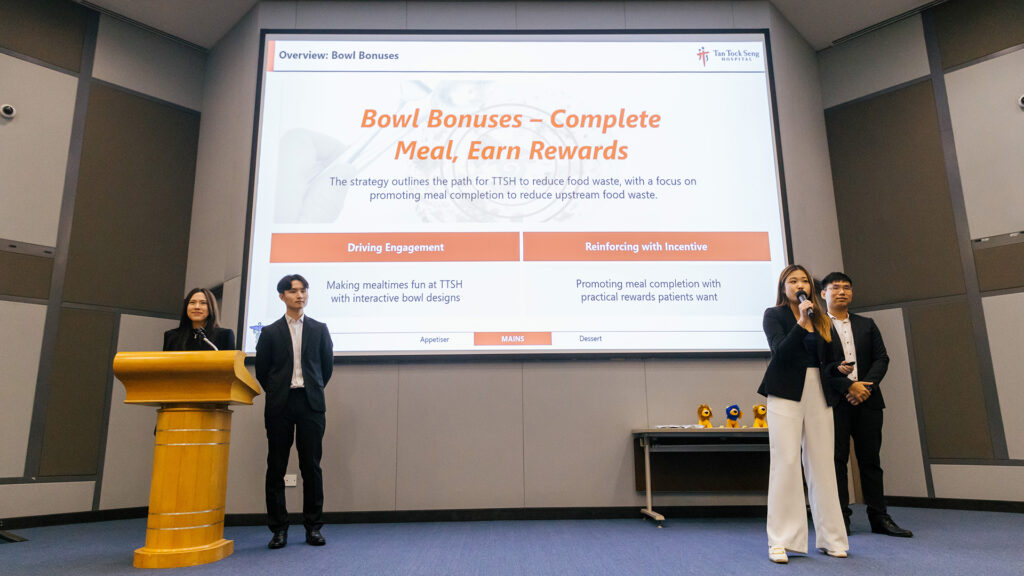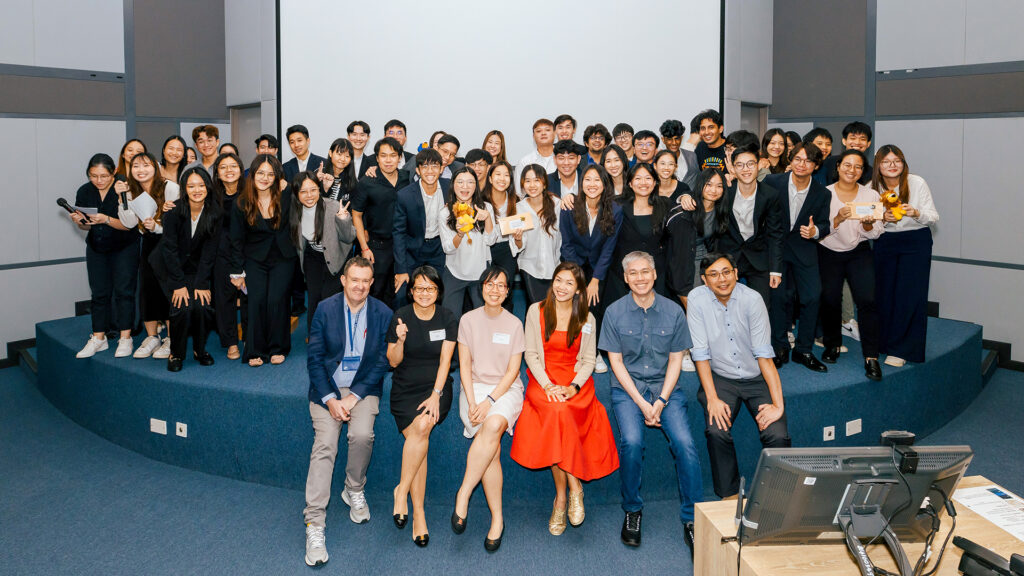Making the case to reduce food wastage in Singapore hospitals
September 27, 2024
IN BRIEF | 10 min read
- The 2024 CHS Case Competition, organised in partnership with Tan Tock Seng Hospital, Centre for Healthcare Innovation and Boston Consulting Group, received a record 78 submissions.

Picture this – in a hospital ward, a patient sits propped up in his bed, his tray of food mostly untouched, his appetite diminished by medication and the weight of illness. The cold food is then taken away by a nurse, ready to be discarded.
This scenario, while unfortunate, is a common issue in Singapore hospitals, where food wastage is a major concern due to factors such as poor patient appetite, limited dietary selection and inconducive eating environments.
Brainstorming ways to address this problem was the focus of this year’s CHS Case Competition, an annual event organised by the NUS College of Humanities and Sciences (CHS). The winning team, made up of students from disciplines such as Pharmaceutical Science and Business, came up with the idea of interactive bowl designs and gamification to tackle patient food leftovers, particularly among elderly patients.
This year’s competition was organised in partnership with Tan Tock Seng Hospital (TTSH), Centre for Healthcare Innovation and Boston Consulting Group, with sponsorship from Moderna. The competition was open to all NUS students, with each team comprising at least one CHS student – a competition prerequisite.
In his address to the 13 finalist teams, Professor Lionel Wee, Co-Dean of CHS and Dean of the NUS Faculty of Arts and Social Sciences noted that the CHS Case Competition is a platform for students to assemble teams with diverse expertise and apply curriculum learning to formulate interdisciplinary solutions to real-world issues.
He said, “Your collective journey as a team has equipped you with invaluable soft skills such as effective communication, consensus building, resourcefulness and the art of presenting and public speaking. These are indispensable lifelong skills and will serve as building blocks for your enduring professional success.”
Building their cases against food waste
To better understand the food wastage problem in TTSH, the students attended a seminar organised by the hospital, where they learnt about the current measures employed to minimise wastage and feedback from patients about their meals. A group of professors from NUS College of Design and Engineering, NUS Business School and the NUS Centre for English Language Communication also organised a series of workshops for students to delve into the intricacies of food wastage and upcycling, supply chain inventory management in the healthcare sector, as well as business case writing and presentation techniques. Students also gained insights into Moderna’s Environmental, Social and Governance (ESG) initiatives.
Building on the knowledge gleaned, the finalist teams devised innovative solutions that involved technology, AI and even psychology, impressing the judges with their creativity in tackling the problem.

Bowled over by the winning pitch
Winning third place and S$1,000 was Team7 whose proposal “Every Meal Counts” targets patient leftovers and excess food surplus in hospitals through a closed-loop solution where patients first order their preferred meals through an app connected to a centralised kitchen and later complete satisfaction surveys to help hospitals better predict their meal preferences.
Second place and S$1,500 went to the team, School of Avocadoes, who called for a three-pronged solution – a food ordering app for patient meal customisation, the use of predictive modelling to optimise buffer meal quantities and the adoption of Modified Atmosphere Packaging technology to extend the shelf life of buffer meals.
Delivering the winning pitch and taking home S$2,000 was Team Pharma X with their “Bowl Bonuses” proposal that aims to reduce food leftovers by elderly patients with poor appetites. By offering meals in “interactive” bowls painted with local cultural designs such as ang ku kueh and iced gem biscuits at the bottom, the team hopes to encourage patients to finish their meals. Those who do so are rewarded with lucky draws to win practical prizes – such as supermarket and retail vouchers or public transport credits – that can be used upon their discharge from the hospital.
Dr Jeannie Tey, Director of Corporate Planning and Chief Sustainability Officer at TTSH, who was part of the panel of judges at the finals, highlighted how Team Pharma X’s proposal demonstrated strong real-world feasibility as it leveraged existing manpower and workflows.
She shared, “Pharma-X emerged as the winning entry by delivering a comprehensive analysis of the problem statement, supported by a clear and compelling rationale for their solution. Their approach skilfully integrated behavioural economics, a structured rewards system, and elements of gamification, making the solution not only practical but also engaging and human-centric.”
Year 3 Pharmaceutical Science student, Xu Qi, who was part of Team Pharma X said, “The competition focused on reducing food waste in hospitals as part of broader ESG efforts, a topic that requires solutions rooted in both business strategy and healthcare knowledge. We learnt that reducing waste in a hospital setting must be balanced with careful attention to patients' nutritional needs, an insight that shaped our solution. This practical knowledge not only enhanced our project but also gave us a deeper appreciation for the real-world implications of our ideas.”
Xu Qi said a key takeaway from this experience is the importance of teamwork and integrating insights across fields to address complex challenges effectively. He also expressed his team’s appreciation for the organisers’ efforts in preparing the teams with workshops on public speaking and presentation skills as this helped ensure they communicated their ideas clearly and confidently. The seminars with healthcare professionals from TTSH were also invaluable as they revealed the intricate relationship between food waste and patient care.
Associate Professor Chng Shu Sin, Vice Dean of Student Life and Alumni Relations at the NUS Faculty of Science, noted that this year’s competition received 78 submissions – the highest since the competition began in 2021. He acknowledged that this was due in part to the interesting problem statement that TTSH came up with.
Assoc Prof Chng said, “The cases are evidence-based and also very interdisciplinary which highlights the gist of what the CHS competition is about. Hopefully, Tan Tock Seng Hospital will see the value in some of these cases and mix and match them into a good solution to deal with food wastage in the hospital.”
This story first appeared on NUSnews on 26 September 2024.

